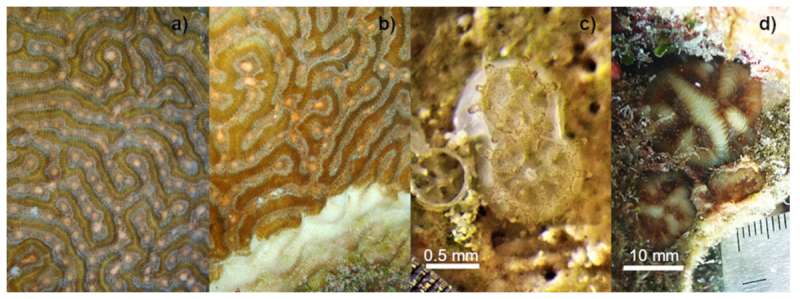This article has been reviewed according to Science X's editorial process and policies. Editors have highlighted the following attributes while ensuring the content's credibility:
fact-checked
peer-reviewed publication
trusted source
proofread
Study shows coral affected by stony coral tissue loss disease can produce viable offspring

Stony coral tissue loss disease (SCTLD) has wreaked havoc on coral reefs across the Caribbean, resulting in significant mortality of various coral species, including Pseudodiploria strigosa, which has been particularly affected in the Mexican Caribbean.
In response to the decreased abundance and colony density caused by SCTLD, scientists have explored larval-based restoration methods, despite concerns about disease transmission. A new PeerJ study reveals that even colonies affected by SCTLD can play a vital role in the assisted sexual reproduction for the restoration of SCTLD-susceptible species.
The study, conducted by Sandra Mendoza Quiroz and a team of researchers from SECORE International and the Universidad Nacional Autónoma de México, evaluated the performance of offspring produced by crossing gametes from a healthy P. strigosa colony, characterized by 100% apparently healthy tissue, with those from a colony affected by SCTLD with over 50% tissue loss. The results were compared with previous crosses involving only healthy parents.
"This study offers a glimmer of hope for the conservation and restoration of Stony Coral Tissue Loss Disease-affected species," said Mendoza Quiroz, the lead author of the study. "Our findings demonstrate that even colonies affected by SCTLD can contribute significantly to the assisted sexual reproduction of susceptible species. This breakthrough could revolutionize current restoration strategies and provide a new avenue for combating the devastating effects of SCTLD."
Remarkably, the fertilization and settlement success rates of the offspring from the diseased parent colony were found to be as high as those from previous crosses involving healthy parents. This discovery highlights the potential of utilizing diseased parent colonies for assisted sexual reproduction, offering a glimmer of hope for the restoration of species impacted by SCTLD.
The study monitored the post-settlement survivorship of the offspring for over a year in outdoor tanks. The results showed a survivorship rate of 7.8%, demonstrating the viability and resilience of the offspring produced from the diseased parent colony.
To further assess the long-term viability of the diseased-parent recruits, they were subsequently outplanted to a degraded reef after thirteen months. Astonishingly, the survivorship of the recruits reached approximately 44%, showcasing their ability to adapt and thrive in challenging environments. Additionally, their growth rate was measured at 0.365 mm ± 1.29 SD per month, further confirming their potential for restoration efforts.
Despite the promising results, the researchers acknowledge the importance of precautionary measures in disease transmission. Further research is warranted to understand the mechanisms of disease resistance and to minimize potential risks associated with assisted sexual reproduction using diseased parent colonies.
The implications of this study extend beyond the Mexican Caribbean and have broader significance for coral reef restoration efforts globally. By leveraging the potential of diseased parents, scientists and conservationists can augment their arsenal of techniques to mitigate the impacts of SCTLD and restore the fragile balance of coral ecosystems.
More information: Sandra Mendoza Quiroz et al, Coral affected by stony coral tissue loss disease can produce viable offspring, PeerJ (2023). DOI: 10.7717/peerj.15519
Journal information: PeerJ
Provided by PeerJ




















